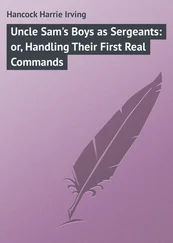Elbridge Brooks - Historic Boys - Their Endeavours, Their Achievements, and Their Times
Здесь есть возможность читать онлайн «Elbridge Brooks - Historic Boys - Their Endeavours, Their Achievements, and Their Times» — ознакомительный отрывок электронной книги совершенно бесплатно, а после прочтения отрывка купить полную версию. В некоторых случаях можно слушать аудио, скачать через торрент в формате fb2 и присутствует краткое содержание. ISBN: , Жанр: foreign_antique, foreign_prose, Биографии и Мемуары, на английском языке. Описание произведения, (предисловие) а так же отзывы посетителей доступны на портале библиотеки ЛибКат.
- Название:Historic Boys: Their Endeavours, Their Achievements, and Their Times
- Автор:
- Жанр:
- Год:неизвестен
- ISBN:http://www.gutenberg.org/ebooks/27157
- Рейтинг книги:3 / 5. Голосов: 1
-
Избранное:Добавить в избранное
- Отзывы:
-
Ваша оценка:
- 60
- 1
- 2
- 3
- 4
- 5
Historic Boys: Their Endeavours, Their Achievements, and Their Times: краткое содержание, описание и аннотация
Предлагаем к чтению аннотацию, описание, краткое содержание или предисловие (зависит от того, что написал сам автор книги «Historic Boys: Their Endeavours, Their Achievements, and Their Times»). Если вы не нашли необходимую информацию о книге — напишите в комментариях, мы постараемся отыскать её.
Historic Boys: Their Endeavours, Their Achievements, and Their Times — читать онлайн ознакомительный отрывок
Ниже представлен текст книги, разбитый по страницам. Система сохранения места последней прочитанной страницы, позволяет с удобством читать онлайн бесплатно книгу «Historic Boys: Their Endeavours, Their Achievements, and Their Times», без необходимости каждый раз заново искать на чём Вы остановились. Поставьте закладку, и сможете в любой момент перейти на страницу, на которой закончили чтение.
Интервал:
Закладка:
Take your atlas, and, turning to the map of Sweden, place your finger on the city of Stockholm. Do you notice that it lies at the easterly end of a large lake? That is the Maelar, beautiful with winding channels, pine-covered islands, and rocky shores. It is peaceful and quiet now, and palace and villa and quaint northern farm-house stand unmolested on its picturesque borders. But channels, and islands, and rocky shores have echoed and re-echoed with the war-shouts of many a fierce sea-rover since those far-off days when Olaf, the boy viking, and his Norwegian ships of war plowed through the narrow sea-strait, and ravaged the fair shores of the Maelar with fire and sword.
Stockholm, the "Venice of the North," as it is called, was not then in existence; and little now remains of old Sigtun save ruined walls. But travellers may still see the three tall towers of the ancient town, and the great stone-heap, alongside which young Olaf drew his ships of war, and over which his pirate crew swarmed into Sigtun town, and planted the victorious banner of the golden serpent upon the conquered walls.
For this fair young Olaf came of hardy Norse stock. His father, Harald Graenske, or "Greymantle," one of the tributary kings of Norway, had fallen a victim to the tortures of the haughty Swedish queen; and now his son, a boy of scarce thirteen, but a warrior already by training and from desire, came to avenge his father's death. His mother, the Queen Aasta, equipped a large dragon-ship or war-vessel for her adventurous son, and with the lad, as helmsman and guardian, was sent old Rane, whom men called "the far-travelled," because he had sailed westward as far as England and southward to Nörvasund (by which name men then knew the Straits of Gibraltar). Boys toughened quickly in those stirring days, and this lad, who, because he was commander of a dragon-ship, was called Olaf the King – though he had no land to rule, – was of viking blood, and quickly learned the trade of war. Already, among the rocks and sands of Sodermann, upon the Swedish coast, he had won his first battle over a superior force of Danish war-vessels.
Other ships of war joined him; the name of Olaf the Brave was given him by right of daring deeds, and "Skoal to the Viking!" rang from the sturdy throats of his followers as the little sea-king of thirteen was lifted in triumph upon the battle-dented shields.
But a swift runner bursts into the gray hall of Sigtun. "To your ships, O King; to your ships!" he cries. "Olaf, the Swedish king, men say, is planting a forest of spears along the sea-strait, and, except ye push out now, ye may not get out at all!"
The nimble young chief sprang from the upraised shields.
"To your ships, vikings, all!" he shouted. "Show your teeth, war-wolves! Up with the serpent banner, and death to Olaf the Swede!"
Straight across the lake to the sea-strait, near where Stockholm now stands, the vikings sailed, young Olaf's dragon-ship taking the lead. But all too late; for, across the narrow strait, the Swedish king had stretched great chains, and had filled up the channel with stocks and stones. Olaf and his Norsemen were fairly trapped; the Swedish spears waved in wild and joyful triumph, and King Olaf, the Swede, said with grim satisfaction to his lords: "See, jarls and lendermen, the Fat Boy is caged at last!" For he never spoke of his stout young Norwegian namesake and rival save as "Olaf Tjocke," – Olaf the Thick, or Fat.
The boy viking stood by his dragon-headed prow, and shook his clenched fist at the obstructed sea-strait and the Swedish spears.
"Shall we, then, land, Rane, and fight our way through?" he asked.
"Fight our way through?" said old Rane, who had been in many another tight place in his years of sea-roving, but none so close as this. "Why, King, they be a hundred to one!"
"And if they be, what then?" said impetuous Olaf. "Better fall as a viking breaking Swedish spears, than die a straw-death 7 7 So contemptuously did those fierce old sea-kings regard a peaceful life, that they said of one who died quietly on his bed at home: "His was but a straw-death."
as Olaf of Sweden's bonder-man. May we not cut through these chains?"
"As soon think of cutting the solid earth, King," said the helmsman.
"So; and why not, then?" young Olaf exclaimed, struck with a brilliant idea. "Ho, Sigvat," he said, turning to his saga-man, "what was that lowland under the cliff where thou didst say the pagan Upsal king was hanged in his own golden chains by his Finnish queen?"
"'T is called the fen of Agnefit, O King," replied the saga-man, pointing toward where it lay.
"Why, then, my Rane," asked the boy, "may we not cut our way out through that lowland fen to the open sea and liberty?"
"'T is Odin's own device," cried the delighted helmsman, catching at his young chief's great plan. "Ho, war-wolves all, bite ye your way through the Swedish fens! Up with the serpent banner, and farewell to Olaf the Swede!"
It seemed a narrow chance, but it was the only one. Fortune favored the boy viking. Heavy rains had flooded the lands that slope down to the Maelar Lake; in the dead of night the Swedish captives and stout Norse oarsmen were set to work, and before daybreak an open cut had been made in the lowlands beneath Agnefit, or the "Rock of King Agne," where, by the town of Södertelje, the vikings' canal is still shown to travellers; the waters of the lake came rushing through the cut, and an open sea-strait waited young Olaf's fleet.
"Unship the rudder; hoist the sail aloft!" commanded Rane the helmsman "Sound war-horns all! Skoal to the Viking; skoal to the wise young Olaf!"
A strong breeze blew astern; the Norse rowers steered the rudderless ships with their long oars, and with a mighty rush, through the new canal and over all the shallows, out into the great Norrström, or North Stream, as the Baltic Sea was called, the fleet passed in safety while the loud war-horns blew the notes of triumph.
So the boy viking escaped from the trap of his Swedish foes, and, standing by the "grim gaping dragon's head" that crested the prow of his war-ship, he bade the helmsman steer for Gotland Isle, while Sigvat the saga-man sang with the ring of triumph:
"Down the fiord sweep wind and rain;
Our sails and tackle sway and strain;
Wet to the skin
We're sound within.
Our sea-steed through the foam goes prancing,
While shields and spears and helms are glancing.
From fiord to sea,
Our ships ride free,
And down the wind with swelling sail
We scud before the gathering gale."
What a breezy, rollicking old saga it is. Can't you almost catch the spray and sea-swell in its dashing measures, boys?
Now, turn to your atlases again and look for the large island of Gotland off the south-eastern coast of Sweden, in the midst of the Baltic Sea. In the time of Olaf it was a thickly peopled and wealthy district, and the principal town, Wisby, at the northern end, was one of the busiest places in all Europe. To this attractive island the boy viking sailed with all his ships, looking for rich booty, but the Gotlanders met him with fair words and offered him so great a "scatt," or tribute, that he agreed not to molest them, and rested at the island, an unwelcome guest, through all the long winter. Early in the spring he sailed eastward to the Gulf of Riga and spread fear and terror along the coast of Finland. And the old saga tells how the Finlanders "conjured up in the night, by their witchcraft, a dreadful storm and bad weather; but the king ordered all the anchors to be weighed and sail hoisted, and beat off all night to the outside of the land. So the king's luck prevailed more than the Finlanders' witchcraft."
Then away "through the wild sea" to Denmark sailed the young pirate king, and here he met a brother viking, one Thorkell the Tall. The two chiefs struck up a sort of partnership; and coasting southward along the western shores of Denmark, they won a sea-fight in the Ringkiobing Fiord, among the "sand hills of Jutland." And so business continued brisk with this curiously matched pirate firm – a giant and a boy – until, under the cliffs of Kinlimma, in Friesland, hasty word came to the boy viking that the English king, Ethelred "The Unready," was calling for the help of all sturdy fighters to win back his heritage and crown from young King Cnut, or Canute the Dane, whose father had seized the throne of England. Quick to respond to an appeal that promised plenty of hard knocks, and the possibility of unlimited booty, Olaf, the ever ready, hoisted his blue and crimson sails and steered his war-ships over sea to help King Ethelred, the never ready. Up the Thames and straight for London town he rowed.
Читать дальшеИнтервал:
Закладка:
Похожие книги на «Historic Boys: Their Endeavours, Their Achievements, and Their Times»
Представляем Вашему вниманию похожие книги на «Historic Boys: Their Endeavours, Their Achievements, and Their Times» списком для выбора. Мы отобрали схожую по названию и смыслу литературу в надежде предоставить читателям больше вариантов отыскать новые, интересные, ещё непрочитанные произведения.
Обсуждение, отзывы о книге «Historic Boys: Their Endeavours, Their Achievements, and Their Times» и просто собственные мнения читателей. Оставьте ваши комментарии, напишите, что Вы думаете о произведении, его смысле или главных героях. Укажите что конкретно понравилось, а что нет, и почему Вы так считаете.












